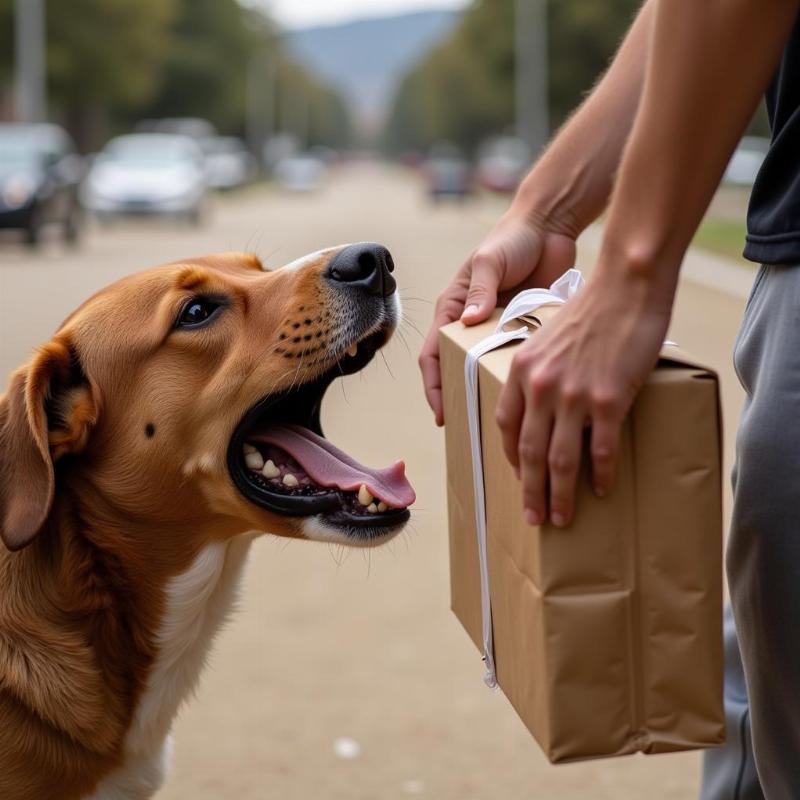When your furry friend transforms into a fierce guardian, it’s natural to feel a mix of pride and concern. “My dog is very protective of me,” is a common sentiment among dog owners, reflecting a deep bond and a desire to understand this complex behavior. While a protective dog can offer a sense of security, it’s crucial to differentiate healthy protectiveness from potentially problematic aggression. This article will explore the reasons behind your dog’s protective instincts, how to discern healthy from unhealthy behaviors, and offer guidance on managing and channeling this protectiveness effectively. Understanding your dog’s motivations is the first step toward fostering a balanced and harmonious relationship.
Decoding Canine Protectiveness: Why My Dog Acts This Way
Several factors contribute to a dog’s protective behavior, ranging from ingrained instincts to learned responses. Breed predisposition plays a role, with certain breeds like German Shepherds and Rottweilers historically bred for guarding duties. However, any dog, regardless of breed, can exhibit protective tendencies.
Your dog’s personality also influences their protective behavior. Some dogs are naturally more wary of strangers, while others are more outgoing and trusting. Early socialization is crucial in shaping a dog’s response to new people and situations. A dog exposed to a variety of positive experiences during puppyhood is less likely to develop excessive protectiveness.
Learned behaviors are another significant factor. If a dog perceives a threat and their protective behavior is rewarded, even unintentionally, they are more likely to repeat it. For example, if you tense up when a stranger approaches and your dog barks, they may interpret your reaction as confirmation of a threat.
Healthy vs. Unhealthy Protection: Recognizing the Difference
Distinguishing between appropriate protective behavior and potentially dangerous aggression is essential. A healthy protective dog will typically display alertness, barking, or positioning themselves between you and a perceived threat. Their body language will be tense but controlled, without signs of aggression like growling, lunging, or snapping.
Conversely, unhealthy protectiveness manifests as uncontrolled aggression. The dog may react excessively to benign situations, such as a delivery person or a friendly neighbor. Their body language will be aggressive, with bared teeth, growling, snarling, and potentially biting. This behavior necessitates professional intervention.
 Aggressive Dog
Aggressive Dog
Managing Your Dog’s Protective Instincts: Tips and Techniques
Managing your dog’s protectiveness involves a combination of training, socialization, and environmental management. Consistent training is key. Teach your dog basic obedience commands like “sit,” “stay,” and “come,” which will help you maintain control in potentially stressful situations. Reward calm behavior and redirect their attention when they display excessive protectiveness.
Socialization is crucial, especially if your dog is naturally wary of strangers. Gradually expose them to a variety of people and situations in a controlled and positive environment. Reward calm behavior and avoid forcing interactions.
Environmental management can also help. If your dog barks excessively at passersby, consider using window coverings or creating a designated safe space where they can relax. Ensure your dog gets plenty of exercise and mental stimulation to reduce anxiety and promote overall well-being.
Conclusion: Fostering a Balanced Bond
Understanding and managing your dog’s protective instincts is vital for a happy and safe coexistence. By recognizing the difference between healthy protectiveness and aggression, and implementing appropriate training and socialization techniques, you can help your dog channel their protective instincts in a positive and controlled manner. Remember, a well-adjusted protective dog is a confident dog, and a confident dog is a happy dog.
FAQ: Frequently Asked Questions about Protective Dogs
- How do I know if my dog’s protectiveness is a problem? If your dog displays aggression towards people or other animals in non-threatening situations, their protectiveness is likely a problem. Consult with a professional dog trainer or behaviorist for guidance.
- Can any dog be protective? Yes, any dog, regardless of breed or size, can exhibit protective tendencies.
- Is it okay to encourage my dog’s protective behavior? No, encouraging protective behavior can escalate into aggression. Focus on training your dog to be calm and confident in all situations.
- What’s the best way to socialize a protective dog? Gradual and positive exposure to new people and situations in a controlled environment is key to socializing a protective dog.
- Should I seek professional help for my dog’s protectiveness? If you are concerned about your dog’s protective behavior, consulting with a professional dog trainer or behaviorist is always recommended.
- How does early socialization affect a dog’s protectiveness? Early socialization plays a crucial role in shaping a dog’s response to new people and situations, reducing the likelihood of developing excessive protectiveness.
- What are some signs of unhealthy protective behavior in dogs? Unhealthy protectiveness manifests as uncontrolled aggression, including growling, snarling, lunging, and biting in non-threatening situations.
Related Articles on Beautdogs.us
- grass seed toxic to dogs
- brown dog with pointy ears
- console car seats for dogs
- boots for shih tzu dogs
Beautdogs.us is your premier online resource for comprehensive dog care information, breed-specific guidance, and expert advice on products and services tailored to the US market. Whether you’re a new dog owner or a seasoned expert, Beautdogs.us provides trustworthy and engaging content to help you navigate every aspect of dog ownership. We offer valuable insights into dog behavior, training tips, and product reviews, empowering you to make informed decisions for your furry companion. Contact us for personalized support at [email protected] or call us at +1 501-555-7529. Visit Beautdogs.us today!